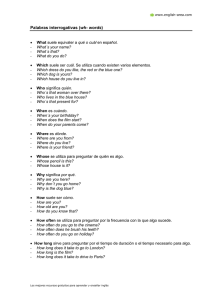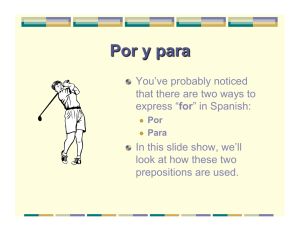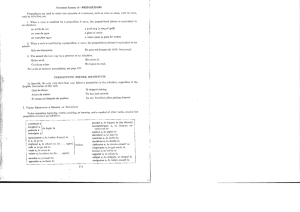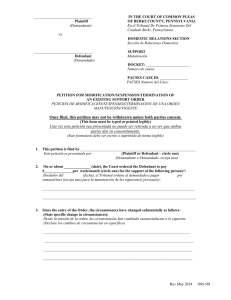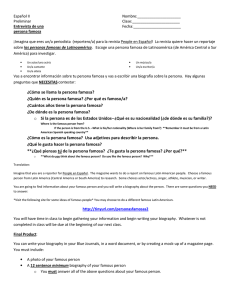ESTACIONES SEASONS The seasons are: spring
Anuncio
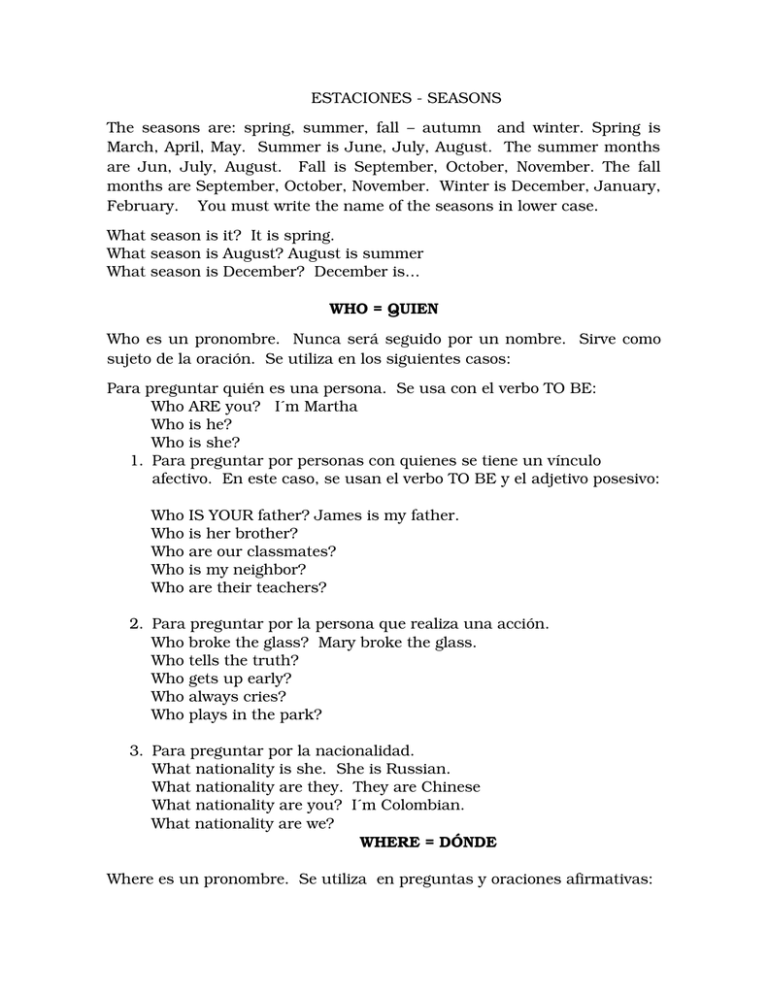
ESTACIONES ­ SEASONS The seasons are: spring, summer, fall – autumn and winter. Spring is March, April, May. Summer is June, July, August. The summer months are Jun, July, August. Fall is September, October, November. The fall months are September, October, November. Winter is December, January, February. You must write the name of the seasons in lower case. What season is it? It is spring. What season is August? August is summer What season is December? December is… WHO = QUIEN Who es un pronombre. Nunca será seguido por un nombre. Sirve como sujeto de la oración. Se utiliza en los siguientes casos: Para preguntar quién es una persona. Se usa con el verbo TO BE: Who ARE you? I´m Martha Who is he? Who is she? 1. Para preguntar por personas con quienes se tiene un vínculo afectivo. En este caso, se usan el verbo TO BE y el adjetivo posesivo: Who IS YOUR father? James is my father. Who is her brother? Who are our classmates? Who is my neighbor? Who are their teachers? 2. Para preguntar por la persona que realiza una acción. Who broke the glass? Mary broke the glass. Who tells the truth? Who gets up early? Who always cries? Who plays in the park? 3. Para preguntar por la nacionalidad. What nationality is she. She is Russian. What nationality are they. They are Chinese What nationality are you? I´m Colombian. What nationality are we? WHERE = DÓNDE Where es un pronombre. Se utiliza en preguntas y oraciones afirmativas: 1. Para averiguar la ubicación de una persona, objeto o animal. WHERE IS THE ELEVATOR? It´s on the left. Where am I? Where is the city? Where is the cat? Where are they? 2. Para preguntar de qué lugar o país es una persona. Where are you from? I´m from Colombia. Where is she from? She´s from United States. Where are they from? They´re from Canada. NOTE: It´s important to know the name of the countries and their nationalities. Please, see the following video: Countries and Nationalities (with sound). COUNTRIES AND NATIONALITIES: Inglaterra: England – English Reino Unido The United Kingdom – British Australia Australia Australia Brasil: Brazil Brazilian España: Spain – Spanish Italia: Italy – Italian Alemania: Germany ­ German Japón: Japan ­Japanese Francia: France ­French Canada: Canada ­Canadian Méjico – Mexico ­Mexican Portugal: Portuga­l Portuguese Sur Africa South Africa ­ South African India: India – Indian Irlanda: Ireland­ Irish China: China – Chinese Grecia: Greece – greek Escocia: Scotland Scottish Rusia: Russia Russian Chile: Chile ­ Chilean Estados Unidos: The U.S.A. – American Argentina: Argentina­ Argentian WHY = POR QUÉ Why se emplea en preguntas para indagar la razón o motivo que ha generado una acción. También, se utiliza en oraciones afirmativas con este mismo significado. Para contestar, generalmente, se emplea: because 1. Why is this soup cold? Por qué esta sopa está fría? Why are you angry? I´m angry because everything is wrong. Why do you cry? 2. Para indicar la causa por la cual se realiza una acción: I´m tired, that is why I´m going to bed. They are curious about the why of our decision.
